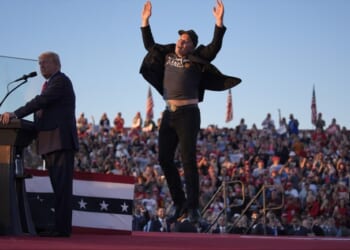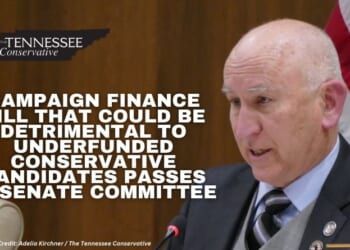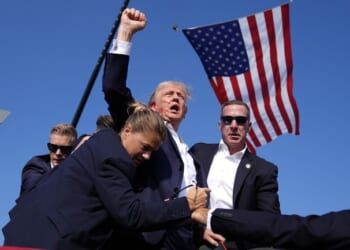THE relationship between the public, justice, the electorate and the law is getting more complex. Potentially it’s been a worse one for the SAS, the Armed Forces and the Defence of the Realm. In an inquest that opened last year, a coroner has ruled that SAS soldiers did not need to use lethal force in an operation in which four IRA terrorists were killed in 1992. A file is therefore being passed to the Director of Public Prosecutions.
Unless he does the decent thing and resigns, Lord Hermer, Sir Keir Starmer’s human rights lawyer pal, is unlikely to decide either that there is no case to answer (killing armed terrorists being the Army’s job) or that it’s so long ago that pursuing this is not in the public interest. Harmer might recuse himself as one of his clients was former head of the IRA Gerry Adams. Don’t hold your breath.
Let’s look at the facts, from the ground up.
The rules of engagement for soldiers in Northern Ireland came from Parliament and were known as ‘The Yellow Card’ after the card carried and learned by rote by every soldier in the province. Soldiers in Northern Ireland had no more rights than a private citizen, so the provisions of the Yellow Card were pretty clear. Essentially soldiers were allowed to open fire on terrorists who were about to commit, were committing or had recently committed a terrorist act and there was no other way to stop them. Warnings were mandatory ‘before opening fire unless . . . to do so would increase the risk of death or grave injury to you or any other person’. The Yellow Card never had statutory authority; soldiers who killed terrorists were subject to arrest and interrogation by local police to determine whether they had committed a crime.
Read that again: any soldier who had just shot and killed a terrorist to protect you was almost immediately arrested on suspicion of manslaughter, or worse. Why? Because although the government sent him to uphold the law with a loaded rifle it didn’t give him any special rights to use it. At one time during the Troubles soldiers were so concerned at the immediate consequences of shooting that they were failing to open fire at legitimate targets.
The fundamental question for the soldier was ‘Do I shoot now?’ Confronting an armed terrorist, the soldier was making this decision under mortal peril and with massive time pressure. Arresting an armed terrorist – also in fear of his life – is far from straightforward. As there is no requirement in common or military law for soldiers recklessly to risk their life, taking the shot is usually the right answer. If they don’t shoot the terrorist survives to kill, bomb and maim the public again.
In this action four IRA men were returning to waiting getaway cars after an attack on the Coalisland police station; a total of ten IRA men were there. An SAS unit was waiting for them and they engaged the IRA men without warning. The four who attacked the police station were killed and three of the others were wounded. There is no doubt that the dead men were armed IRA terrorists.
There is evidence that some of the dead were killed at close range when they were on the ground, having already been hit by multiple bullets. So what? The decision to kill them had been made when the first round was fired. Armed men are a lethal threat and, unlike in the movies, a hail of bullets seldom delivers instant death. A dying terrorist may have a grenade in his pocket, so he’s still a threat to the soldier and his colleagues. A firefight and its aftermath are no place for the squeamish.
The salient point is whether the 12 SAS soldiers opening fire believed they could find any way of arresting ten IRA men, at least four of whom were armed, at night in hostile territory. Clearly they thought not, hence they engaged. On the evidence before him the coroner thought differently, as is his right – indeed his duty. Last year he found that a similar action in 1991 which killed three IRA men was lawful. His independence is not in question, it’s the law itself that is wrong.
Now, 33 years later, the SAS men potentially face a criminal trial. Notwithstanding the coroner’s opinion, that result seems wrong – 96 per cent of those polled by the Telegraph opposed it. At the time there was little sympathy for the IRA men outside the Irish Republican and Nationalist movements. The public were hugely supportive of the SAS and the armed forces then, as they are now. The law, as created by a selection of politicians of all parties over almost half a century, has failed. It’s not just the elite SAS that are being failed, it’s every serviceman and woman, and indeed the society they seek to defend. The deficiencies in the legal status of the combatants in the Ulster Troubles were known since it began. The failure to find an end to the arguments when peace came was rank moral cowardice that is all too typical of Westminster.
In 2023 the Conservatives belatedly introduced the Northern Ireland Legacy Act to prevent this sort of prosecution. The Labour Party had a manifesto commitment to repealing it, because the High Court has found it in contradiction to, you guessed it, the European Convention on Human Rights. Hilary Benn is proud of introducing the repeal Act. https://www.bbc.co.uk/news/articles/cjdnlegxx0po .
When pressed, the likes of Hilary Benn, Lord Hermer and Two-Tier will say that the UK leaving the ECHR would send the wrong message to the world and damage our international reputation. They may go on and say that countries such as Russia aren’t members of the ECHR. That entire argument is complete cant; it may make sense in a university debating club or over a glass of champagne in Matrix Chambers, but it’s balderdash. The list of countries not in the ECHR incudes the United States, Singapore, Australia, New Zealand and Dubai – all top destinations for the wealthy fleeing the UK.
One of the most powerful messages we sent to the world was when the SAS emerged from obscurity and ended the Libyan Embassy siege. The message was stark and clear: ‘The UK does not deal with terrorists.’ International terrorists steered well clear of us and the UK became a valued partner in the establishment of SAS-like units across the world. (Note for Lammy: that’s what soft power looks like. It comes from having a very competent military that is feared globally, so other nations tread softly round your interests and seek your friendship.)
Now Labour wants to throw the SAS and the rest of the armed forces under a legal bus rather than support them. It was a manifesto commitment in the general election, but no one noticed or kicked up about it. Why? Because the self-appointed intellectual elite wanted a left-wing coup – which is what the election turned out to be.
Ex-KGB man President Putin must have laughed when the left triumphed here in July. Sixty years of sedition (the KGB’s speciality) may have paid off too late for the Soviet Union, but it’s done for us.










